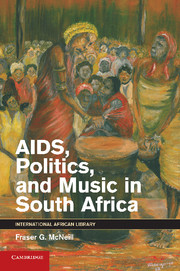Book contents
- Frontmatter
- Contents
- Maps
- Preface
- Acknowledgements
- Abbreviations
- Select Glossary of Tshivenda Terms in the Text
- Maps
- 1 Introduction
- 2 The Battle for Venda Kingship
- 3 A Rite to AIDS Education? Venda Girls’ Initiation, HIV Prevention, and the Politics of Knowledge
- 4 ‘We Want a Job in the Government’
- 5 ‘We Sing about What We Cannot Talk About’
- 6 Guitar Songs and Sexy Women
- 7 ‘Condoms Cause AIDS’
- 8 Conclusion
- Appendix A: Songs on Accompanying Web Site
- Appendix B: ‘Zwidzumbe’ (Secrets)
- Appendix C: AIDS, AIDS, AIDS
- References
- Index
6 - Guitar Songs and Sexy Women
A Folk Cosmology of AIDS
Published online by Cambridge University Press: 05 November 2011
- Frontmatter
- Contents
- Maps
- Preface
- Acknowledgements
- Abbreviations
- Select Glossary of Tshivenda Terms in the Text
- Maps
- 1 Introduction
- 2 The Battle for Venda Kingship
- 3 A Rite to AIDS Education? Venda Girls’ Initiation, HIV Prevention, and the Politics of Knowledge
- 4 ‘We Want a Job in the Government’
- 5 ‘We Sing about What We Cannot Talk About’
- 6 Guitar Songs and Sexy Women
- 7 ‘Condoms Cause AIDS’
- 8 Conclusion
- Appendix A: Songs on Accompanying Web Site
- Appendix B: ‘Zwidzumbe’ (Secrets)
- Appendix C: AIDS, AIDS, AIDS
- References
- Index
Summary
Peer educators are not the only people who sing songs about AIDS in Venda. It is also a popular theme in the male-dominated solo genre known as zwilombe (singular, tshilombe). Exploring this genre facilitates a critical appraisal of the peer educators’ efforts through a wider ethnographic lens; it demonstrates the extent to which Venda men and older (initiated) women frame the educators’ actions in terms of a dynamic ‘folk model’ (Good 1994) of sexual illness. This model of understanding, albeit expressed through a male genre of zwilombe, is rooted in and parallels the knowledge recounted in the female initiation schools recently bolstered by King Tshivhase's engagement with the African renaissance. This model captures peer educators – and the biomedical knowledge they tout – in a web of suspicion and blame, labelling them as vectors of the virus. As experts in biomedicine, their conspicuous knowledge of contraception (and to a lesser extent abortion) translates, in the folk model, as a reflection of their own intimate experience. They are thought to be acquainted with the regulation of their own reproductive capacities in unnatural and inherently dangerous ways. They are thus thought to be contaminated with blood-bound pollution, and are constructed as constituting a threat to fertility that places them at the very heart of the perceived crisis of social reproduction.
Folk models or indigenous knowledge systems (IKS; see Chapter 4) represent ‘a culture's collective body of accumulated knowledge and wisdom’ (Liddell et al. 2005: 624). Whilst this definition may suggest that ‘a culture’ has a fixed way of understanding the world, indigenous systems of knowledge are, of course, fluid and open to the incorporation of outside elements. This is especially the case in the representation of illness. Southern African folk models have readily incorporated elements of biomedical explanation since their earliest exposure to them. Notions such as pollution, infection, bacteria, or dirt have long been common proximate causes of ill health, answering the ‘How?’ beyond which witchcraft and ancestral vengeance generally provide ultimate explanations for the ‘Why?’
- Type
- Chapter
- Information
- AIDS, Politics, and Music in South Africa , pp. 180 - 202Publisher: Cambridge University PressPrint publication year: 2011



